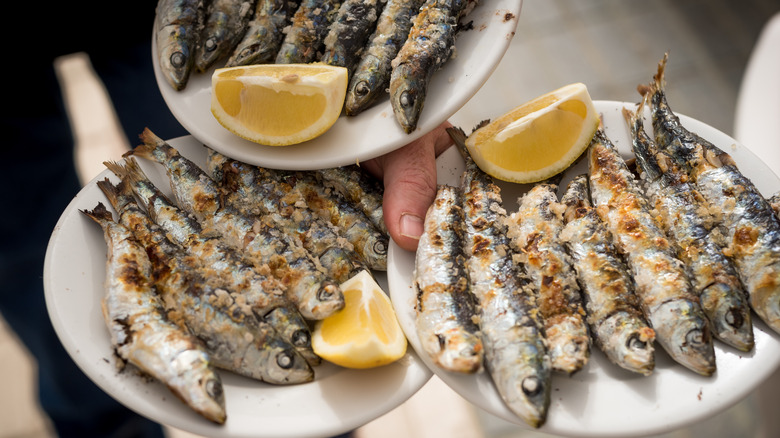Here's The Popular Fish With The Lowest Mercury Levels
Fish is often touted as one of the healthiest meats you can eat — it's lean and can contain beneficial fatty acids like Omega-3s. But in recent years, naysayers have pointed out one big problem with fish: mercury. A liquid metal, mercury is found in Earth's crust, where it clings to rocks and coal. Naturally occurring events like a volcano eruption can release mercury into the atmosphere, where it gets into the air, water, and soil. However, these events aren't as recurring as human activities that are responsible for releasing mercury, such as the burning of coal and oil to produce electricity. Unwanted mercury exposure may lead some to stop eating fish altogether. But instead of doing away with it completely, you can set your eyes on the species that has the lowest mercury levels: sardines.
The Food and Drug Administration has found that sardines are the fish with the lowest mercury levels, with only 0.013 parts per million. Tilapia has the same number, but the sample size was 32 instead of 90, so it's possible that its average levels of mercury are actually slightly higher. On the other hand, tilefish is the worst when it comes to contamination, with 1.123 parts per million. Mollusks and crustaceans like scallops, clams, shrimp, and oysters all have lower levels of mercury than any of the fish studied, so those are also great options if you want to enjoy seafood.
How sardines can be good for your health
So what's the problem with mercury? Mercury can be extremely toxic at high levels, and increased exposure to the metal is creating a flurry of health problems. Issues associated with mercury exposure include brain, heart, and lung malfunctions, a weakened immune system, and even kidney failure. Since fish is the main way that most people are coming into contact with the metal, it makes sense to wonder if you should even be eating anything that comes from the sea. The problem is that avoiding seafood altogether can be complicated (not to mention, you'd have to give up so many delicious meals!).
But, really, you can't go wrong with sardines. The best part about them is that — unlike foods like chicken and corned beef, which should never be eaten from a can) — canned sardines taste delicious. They're also very convenient. You can quickly whip up a meal like lemon sardine pasta or make a sandwich in a manner of minutes. Besides having low mercury levels, sardines are a good source of calcium, potassium, iron, vitamin E, and other nutrients. That said, canned sardines do tend to also be high in sodium. If that poses a health issue for you, we recommend buying fresh sardines instead. You'll have to spend a bit more time cooking them, but because they're usually no bigger than 12 inches, they don't take too long to be ready. Enjoy them knowing you're not putting (as much) mercury into your system.

